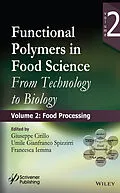Polymers are an important part in everyday life; products made from polymers range from sophisticated articles, such as biomaterials, to aerospace materials. One of the reasons for the great popularity exhibited by polymers is their ease of processing. Polymer properties can be tailored to meet specific needs by varying the atomic composition of the repeat structure, by varying molecular weight and by the incorporation (via covalent and non-covalent interactions) of an enormous range of compounds to impart specific activities. In food science, the use of polymeric materials is widely explored, from both an engineering and a nutraceutical point of view. Regarding the engineering application, researchers have discovered the most suitable materials for intelligent packaging which preserves the food quality and prolongs the shelf-life of the products. Furthermore, in agriculture, specific functionalized polymers are used to increase the efficiency of treatments and reduce the environmental pollution. In the nutraceutical field, because consumers are increasingly conscious of the relationship between diet and health, the consumption of high quality foods has been growing continuously. Different compounds (e.g. high quality proteins, lipids and polysaccharides) are well known to contribute to the enhancement of human health by different mechanisms, reducing the risk of cardiovascular disease, coronary disease, and hypertension. This second volume focuses on the importance of polymers and functional food and in food processing
Autorentext
Giuseppe Cirillo received his PhD in 2008 from the University of Calabria, Italy, where he is currently in a post-doctoral position. His research interests are in the development of functional polymers with tailored biological activity, antioxidant, antimicrobial, and anticancer chelating,, the design of smart hydrogels for drug delivery, the study of the activity of innovative functional foods and nutraceuticals, and the synthesis and functionalization of carbon nanotubes, based devices for biomedical applications. He is the author and coauthor of more than 100 publications, including four edited books with Wiley Scrivener.
Umile Gianfranco Spizzirri obtained his PhD in 2005 from the University of Calabria. He is currently a member of the Technical Staff at the Department of Pharmacy, Nutrition and Health Science of the same university. His research activities are mainly related to the polymer chemistry and technology for the preparation of stimuli-responsive drug delivery system, functional polymers for food industry, and new analytical methodologies for the food quality and safety assessment. He is the author and coauthor of more than 100 publications, including three edited books with Wiley Scrivener.
Inhalt
Preface xiii
1 Functional Polymers for Food Processing 1
Giuseppe Cirillo, Umile Gianfranco Spizzirri and Francesca Iemma
1.1 Introduction 1
1.2 Food Preparation 2
1.3 Food Processing: Rheology 5
1.4 Functional Foods and Nutraceuticals 5
References 6
2 Polyacrylamide Addition to Soils: Impacts on Soil Structure and Stability 9
Guy J. Levy and David N. Warrington
2.1 Introduction 9
2.2 Polyacrylamide (PAM) Properties and Interactions with Soil 10
2.3 Polymer Effects on Aggregate Stability 14
2.4 PAM Effects on Soil Saturated Hydraulic Conductivity 16
2.5 PAM Effects on Infiltration, Runoff and Erosion 19
2.6 Concluding Comments 25
References 26
3 Functional Polymeric Membrane in Agriculture 33
Yuichi Mori
3.1 Introduction 33
3.2 Principle of Imec 34
3.3 Imec System 37
3.4 Plant Cultivation by Imec System 39
3.5 Comparison between Imec and Hydroponics 40
3.6 Current Domestic State of Imec Growth 42
3.7 Imec Vegetables besides Tomato 43
3.8 Imec Changes Barren Land to Farming Land 43
3.9 Current State of Overseas Growth of Imec 45
References 45
4 Enzymes Used in Animal Feed: Leading Technologies and Forthcoming Developments 47
Daniel Menezes-Blackburn and Ralf Greiner
4.1 Introduction: General Outline and Value Drivers 48
4.2 Feed Digestive Enzymes 49
4.3 Actual and Potential Feed Enzyme Market 59
4.4 Advances in Feed Enzyme Technology 60
4.5 Conclusions and Future Perspectives 63
Acknowledgments 63
References 63
5 Interaction of Biomolecules with Synthetic Polymers during Food Processing 75
K. Narsaiah
5.1 Introduction 75
5.2 Basic Biomolecules in Food and Their Interactions with Synthetic Polymers 76
5.3 Membranes for Food Processing 78
5.4 Chromatography for Food Processing 91
5.5 Analogy of Ultrafiltration and Size Exclusion Chromatography 92
5.6 Future Perspectives of Membranes and Chromatography 93
References 94
6 Rheological Properties of Non-starch Polysaccharides in Food Science 99
Anna Ptaszek, Pawel Ptaszek and Marcin Lukasiewicz
6.1 Non-starch Hydrocolloids 99
6.2 Rheological Properties of Non-starch Hydrocolloid Systems 108
References 129
7 Polysaccharides as Bioactive Components of Functional Food 133
Patricia Peso-Echarri, Carlos Alberto González-Bermúdez, Gaspar Ros-Berruezo, Carmen Martinez-Graciá and Carmen Frontela-Saseta
7.1 Introduction 134
7.2 Functional Foods 135
7.3 Polysaccharides from Seaweed 137
7.4 Functional Activity of Polysaccharides 141
7.5 Conclusions 150
References 150
8 Milk Proteins: Functionality and Use in Food Industry 159
Seval Andiç and Gökhan Boran
8.1 Introduction 159
8.2 Milk Proteins 161
8.3 Milk Protein Products 163
8.4 Functional Properties of Milk Proteins 166
8.5 Conclusions 174
References 175
9 Bioactive Peptides from Meat Proteins as Functional Food Components 181
Jianping Wu, Forough Jahandideh, Wenlin Yu and Kaustav Majumder
9.1 Introduction 181
9.2 Generation of Bioactive Peptides in Meat 183
9.3 Meat-Derived Bioactive Proteins and Peptides 184
9.4 Conclusion 196
References 197
10 Antioxidant Po...
